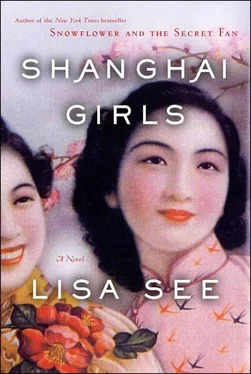“For so long I’ve been embarrassed and ashamed before you, but now you know,” he says. “You married a rickshaw puller.”
In my heart I believe him, but my mind thinks otherwise. “But you’re the fourth son-”
“Only a paper son. Always in China people ask, ‘Kuei hsing?’ -What’s your name?-but really it means, ‘What is your precious family name?’ Louie is just a chi ming- a paper name. I’m actually a Wong. I was born in Low Tin Village, not far from your home village in the Four Districts. My father was a farmer.”
I sit on the edge of the bed. My mind spins: a rickshaw puller and a paper son. This makes me a paper wife, so we’re both here illegally. I feel sick to my stomach. Still, I recite the facts from the coaching book: “Your father is the old man. You were born in Wah Hong. You came here as a baby-”
Sam shakes his head. “That boy died in China many years ago. I traveled here using his papers.”
I remember Chairman Plumb showing me a picture of a little boy and thinking that it didn’t look all that much like Sam. Why hadn’t I questioned that more? I need to hear the truth. I need it for me, for my sister, and for Joy. And I need him to tell me everything- without having him close up and slump away as he usually does. I use a tactic I learned from my weeks of interrogations at Angel Island.
“Tell me about your village and your real family,” I say, hoping my voice doesn’t shake too much from the emotions I feel and believing if he talks about these comfortable things, then maybe he’ll tell me the truth about how he came to be a paper son to the Louies. He doesn’t answer right away. He stares at me in the way he has so many times since the first day we met. Always I’ve seen that look as sympathy for me, but maybe he’s been trying to show compassion for our shared troubles and secrets. Now I try to match his expression. The funny thing is, I mean it.
“We had a pond in front of our house,” he murmurs at last. “Anyone could throw fish in it and raise them. You could dip a crock in the water, pull it out, and there’d be fish in your crock. No one had to pay. When the pond ran dry, you could pick up fish sitting in the mud. Still, no one had to pay. In the field behind our house, we grew vegetables and melons. We raised two pigs a year. We were not rich, but we were not poor either.”
It sounds poor to me. His family had lived from dirt to mouth. He seems to sense my understanding as he goes on haltingly.
“When the drought came, my grandfather, father, and I worked hard, trying to make the ground yield to our desires. Mama went to other villages to earn money by helping others plant or harvest rice, but those places also suffered from no rain. She wove cloth and took it to market. She tried to help our family, but it wasn’t enough. You can’t live on air and sunshine. When two of my sisters died, my father, my second brother, and I went to Shanghai. We wanted to earn enough to go back to Low Tin Village and farm again. Mama stayed home with my youngest brother and sister.”
In Shanghai, they found not promise but hardship. They didn’t have connections, so they couldn’t get factory jobs. Sam’s father took work as a rickshaw puller, while Sam, who’d just turned twelve, and his brother, who was two years younger, scavenged for small jobs. Sam sold matches on street corners; his brother ran after coal trucks to pick up pieces that fell from the beds to sell to the poor. They ate watermelon rinds plucked from trash pits in summer and watered down jook in winter.
“My father pulled and pulled,” Sam continues. “At first he drank tea with two lumps of sugar to restore his strength and cool his skin. When money ran low, he could only afford cheap tea made from dust and stems and no sugar. Then, like so many pullers, he began smoking opium. Not real opium! He couldn’t afford that! And not for pleasure either. He needed it for stimulation, to keep pulling in the hottest weather or if there was a typhoon. He bought the dregs left over from the rich and sold by servants. The opium gave my father false vigor, but his strength was eaten and his heart shriveled. Pretty soon he began to cough blood. They say that you never see a rickshaw puller reach age fifty and that most pullers are already past their best days by the time they turn thirty. My father died when he was thirty-five. I wrapped him in a straw mat and put him on the street. Then I took his place, selling my sweat by pulling a rickshaw. I was seventeen and my brother was fifteen.”
As he talks, I think about all the rickshaws I’ve ridden in and how I never really thought about the men who pulled them. I hadn’t considered pullers actual people. They’d seemed barely human. I remember how many of them had not owned shirts or shoes, the way their spines and shoulder blades had protruded from their skin, and the sweat that had oozed from their bodies even in winter.
“I learned all the tricks,” Sam goes on. “I learned I could get an extra tip if I carried a man or woman from my rickshaw to the door during typhoon season so they wouldn’t ruin their shoes. I learned to bow to women and men, invite them to ride in my li-ke-xi , call them Mai-da-mu for Madame or Mai-se-dan for Master . I hid my shame when they laughed at my bad English. I made nine silver dollars a month, but I still couldn’t afford to send money home to my family in Low Tin. I don’t know what happened to them. They’re probably dead. I couldn’t even take care of my brother, who joined other poor children helping to push rickshaws over the arched bridges at Soochow Creek for a few coppers a day. He died of the blood-lung disease the next winter.” He pauses, his mind back in Shanghai. Then he asks, “Did you ever hear the rickshaw pullers’ song?” He doesn’t wait for me to answer but begins to sing:
“To buy rice, his cap is the container.
To buy firewood, his arms are the container.
He lives in a straw hut.
The moon is his only lamplight.”
The melody comes back to me, and my mind is transported to Shanghai ’s streets and rhythms. Sam is talking about his hardship, but I feel loneliness for my home.
“I listened to riders who were Communists,” he continues. “I heard them complain that since ancient times poor men have been urged to find contentment in poverty. That was not my life. That was not why my father and brother died. I wish I could have changed their fates, but once they were gone all I could think about was my own mouth. I thought, if the leaders of the Green Gang got their starts pulling rickshaws, then why couldn’t I? I had no schooling in Low Tin. I was a farmer’s son. But even pullers understood the importance of education, which is why the rickshaw guild sponsored schools in Shanghai. I learned the Wu dialect. I learned more English-not the ABCs but some words.”
The more Sam talks, the more my heart opens to him. When I first met him in the Yu Yuan Garden, I hadn’t thought he was so bad. Now I see just how hard he’s tried to change his life and how little I’ve understood. He speaks Sze Yup fluently and the Wu dialect of the streets, while his English is practically nonexistent. He’s always looked uncomfortable in his clothes. I remember the day we met noticing his shoes and suit were new. They must have been the first he owned. I remember the red tinge to his hair and mistakenly believing it had something to do with the fact that he was from America and not recognizing it as the well-known sign of malnutrition. And then there is his manner. He’s always been deferential to me, treating me not as a fu yen but as a customer who must be pleased. He’s always bowed down to Old Man Louie and Yen-yen-not because they’re his parents but because he’s like a servant to them.
Читать дальше












